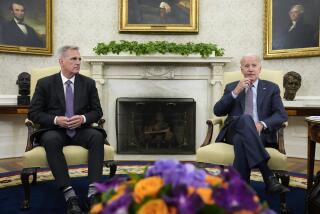No More Excuses to Go Easy on Cigarette Makers
- Share via
President Clinton’s largely negative verdict Wednesday on the proposed $368.5-billion tobacco deal comes as no surprise. But while his evaluation may put some details of the landmark agreement between cigarette manufacturers and 39 state attorneys general in limbo, the president nonetheless emphatically embraced its major principles, namely regulation of the nicotine content in cigarettes and strong steps against teenage smoking. Congress members who said they were waiting for Clinton’s signal to take action against the tobacco industry now have no excuse to delay.
The tobacco deal, negotiated last June, called on an industry long regarded as omnipotent to grant historic concessions regarding sick smokers and young people. To settle class-action lawsuits pending across the nation, the industry agreed to compensate states for the costs of treating smoking-related illnesses, to accept stiff new limits on cigarette advertising and to cooperate in programs aimed at reducing underage smoking.
Criticism of the proposed pact began immediately. Most valid were complaints that the deal hobbled the U.S. Food and Drug Admin- istration’s ability to regulate nicotine, the addictive drug in cigarettes, and efforts to reduce teenage smoking. The president had reserved his judgment pending advice from a task force he created to review the pact. His announcement leaves no doubt that he sees the same weak spots that earlier critics noted.
Clinton wants a 60% cut in youth smoking in a decade and seeks legislation giving the FDA unfettered authority over the nicotine content in cigarettes and hiking taxes on them by up to $1.50 per pack to help achieve that cut. These steps should help.
Congress always had the power to extend to the FDA the same authority over nicotine it grants the agency over other drugs. But lawmakers have never been keen to bite the hand of an industry that has long fed them so generously at campaign time.
Separate multibillion-dollar pacts reached over the summer to avert trials involving the tobacco industry in Mississippi and Florida, along with pending trials in Texas and Minnesota, may be giving legislators some courage to take more comprehensive steps. Two recent votes are reason for optimism. The Senate earlier this month reversed itself and approved $30 million to help states implement an existing FDA program to restrict teenage smoking. And on Wednesday the House, following Senate approval, voted to reverse an unconscionable $50-billion tax break for cigarette makers.
Getting congressional approval on a tax hike, even one targeted at cigarettes, will not be easy, and achieving consensus on granting the FDA much-needed authority over nicotine will be even harder. But both goals are indisputably necessary.
More to Read
Get the L.A. Times Politics newsletter
Deeply reported insights into legislation, politics and policy from Sacramento, Washington and beyond. In your inbox twice per week.
You may occasionally receive promotional content from the Los Angeles Times.










